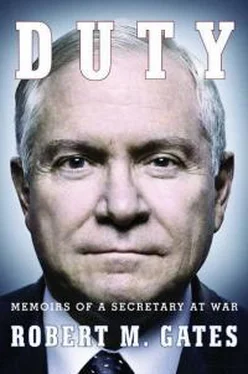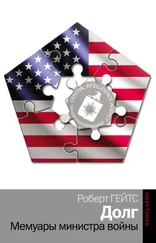I saw firsthand the age-old reality that the qualities important for military leadership and success in war are not the same as those required in peacetime. In war, boldness, adaptability, creativity, sometimes ignoring the rules, risk taking, and ruthlessness are essential for success. These are not characteristics that will get an officer very far in peacetime. Over the ten years of the Iraq and Afghan wars, too many officers were assigned to command positions because the stateside personnel system identified them as “next in line” rather than because they were selected as best qualified for the combat mission. And too many talented officers who achieved real battlefield success were rotated out of command in Iraq and Afghanistan too soon simply to keep the personnel system running smoothly. When we are in a fight, field commanders and the combatant commanders should be given the authority to relieve under-performers or keep good officers in command. In wartime, I believe the routine peacetime officer-assignment process should be set aside and senior field commanders should be empowered to choose their subordinate commanders. The failure to do this was, in my view, consistent with the peacetime mentality that pervaded the entire Defense Department, business-as-usual the order of the day among senior civilians and even among most generals and admirals, even as the troops were fighting and dying. I should not have allowed it.
RUNNING THE DEFENSE DEPARTMENT
The Department of Defense is the largest, most complex organization on the planet: three million people, civilian and military, with a budget, the last year I was there, of over $700 billion. Nearly everyone there is a career professional, with considerable job security. Every major part of the organization—budget, acquisition programs, and policy—has a constituency both inside and outside the Pentagon. Local and state officials, members of Congress, lobbyists, industry, retired senior officers—everyone has an oar in the water, many of them pulling in different directions. So how does a secretary gain control, then establish and implement an agenda for change?
Above all, if a secretary actually intends to run the Pentagon—and make real changes—as opposed to presiding over it, he must be selective in identifying his agenda, and both realistic and single-minded in developing strategies for achieving each specific goal. Exhortations to be more efficient or to achieve some broad goal are akin to shouting down a well. Very specific objectives, with tight deadlines and regular inperson reports to the secretary himself, provide the only way to get people focused and to ensure they are performing. The organization must understand that the secretary is personally invested in these issues and determined to drive the process to specific outcomes. This was what I did during the first two years with regard to MRAPs, ISR, medevac, wounded warrior care, and other changes to help those fighting the wars in Iraq and Afghanistan. As noted repeatedly, I also held regular videoconferences with our commanders in Baghdad and Kabul to closely monitor progress in the two wars, to ensure that their needs were being met by the Pentagon, and to keep them informed about the Washington battlespace. It was the same approach I took to the big cuts and caps I implemented in programs in the spring of 2009, and then in the efficiencies effort in 2010.
In implementing an agenda for change, the secretary cannot delegate the hard work to the deputy secretary, who simply doesn’t have the clout in the building, at the White House, or in Congress to push through changes on big issues. The secretary has to master the details and fully understand the issues and problems. The challenge is to maintain a high-level, broad perspective, understand enough details to make sensible and executable decisions, and then delegate responsibility for implementation. “Microknowledge” must not become micromanagement, but it sure helps keep people on their toes when they know that the secretary knows what the hell he’s talking about. If the secretary of defense doesn’t do all of this, he becomes a “kept” man at the Pentagon, enjoying all the accouterments of position and authority—the big plane, massive entourages, lots of ceremonies and speeches—but held hostage by the military services, the Pentagon bureaucracy, and his own staff, without the knowledge or influence to effectively lead the department in new directions, much less put the place on a war footing.
In every aspect of running the department, the senior civilians and political appointees are critically important. I have not given due credit in these pages to those civilians who played a key role in everything I did—and accomplished—as secretary. Career professionals and political appointees, men and women, worked countless hours to prepare me for meetings and helped shape decisions, then saw to their implementation. I depended on these civilians to help me frame the agenda for change, to help me come up with specific strategies for accomplishing each initiative. Their insights, dedication, and skills are critical assets that any secretary of defense and the American public must always value. Because while the military trains and equips our forces, provides professional military advice to the civilian leadership, and, when necessary, fights our wars, it is the Defense civilians who make the entire giant enterprise work—or not. First on the list for pay and hiring freezes, furloughs, and firings when the budget is being cut, they are the enduring backbone of the department. I have often criticized the Pentagon bureaucracy in these pages, but given the right leadership and clear direction, these public servants can move mountains. Anyone who wants to reform the Pentagon had better remember that these civilians are essential to success. They were for mine.
CONGRESS
I was always schizophrenic about Congress. In the abstract, I saw it as a critical check on the executive branch and guarantor of our freedom. For that reason, I had long been a strong advocate of effective congressional oversight. As secretary, I consistently tried to be respectful of the role of Congress and responsive to its requests and views. I urged my civilian and military subordinates to behave similarly. Early in my tenure as secretary, I told cadets and midshipmen at the military academies that as officers, they would need to remind their subordinates that Congress was one of two pillars of our freedom (the other being the press), a coequal branch of government that under the Constitution “raises armies and provides for navies.” Many senators and congressmen were longtime supporters of men and women in uniform, and we had an obligation to be “honest and true” in reporting to them. In my first senior staff meeting as secretary, I said I wanted a strong, respectful, and positive relationship with Congress. I also knew that the Founding Fathers had created a system of government designed primarily for the preservation of liberty, not for efficient or agile government.
On a day-to-day basis, I believe, in that last regard, that the Founders succeeded beyond their wildest aspirations. Congress is best viewed from a distance—the farther the better—because up close it is truly ugly. And nearly every day I was secretary, I was dealing with Congress up close.
As I wrote earlier, I have less reason to complain about Congress than just about anyone who has served in the executive branch. Over four and a half years, the Armed Services and Appropriations Committees—as well as the congressional leadership and others—almost always treated me with respect and civility. The exceptions I can count on the fingers of one hand. But it seemed like every day, in nearly every way, we were in conflict that went well beyond the expected, healthy friction between two coequal branches of government.
Читать дальше












